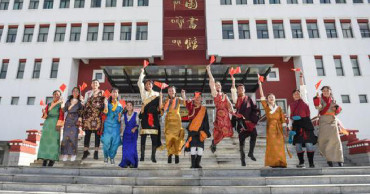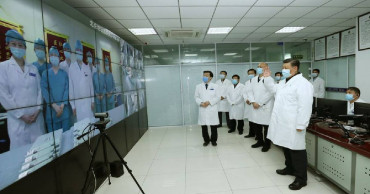President Xi Jinping
Biden to meet China's Xi on Monday for Taiwan, Russia talks
President Joe Biden will meet Monday with President Xi Jinping on the sidelines of next week’s Group of 20 Summit in Bali, Indonesia, a face-to-face meeting that comes amid increasingly strained U.S.-China relations, the White House announced Thursday.
It will be the first in-person meeting between the leaders of the world’s two biggest economies since Biden became president in January 2021 and comes weeks after Xi was awarded a norm-breaking third, five-year term as the Chinese Communist Party leader during the party’s national congress.
White House press secretary Karine Jean-Pierre said in a statement the leaders will meet to “discuss efforts to maintain and deepen lines of communication between” the two countries and to "responsibly manage competition and work together where our interests align, especially on transnational challenges that affect the international community.”
The White House has been working with Chinese officials over the last several weeks to arrange the meeting. Biden on Wednesday told reporters that he intended to discuss with Xi growing tensions between Washington and Beijing over the self-ruled island of Taiwan, trade policies, Beijing’s relationship with Russia and more.
“What I want to do with him when we talk is lay out what each of our red lines are and understand what he believes to be in the critical national interests of China, what I know to be the critical interests of the United States,” Biden said. “And determine whether or not they conflict with one another.”
Read more: Biden, Trump to make final appeals ahead of crucial midterms
The White House sought to downplay expectations for the meeting, telling reporters there was no joint communique or deliverables anticipated from the sit-down.
“I don’t think you should look at this meeting as one in which there’s going to be specific deliverables announced," White House national security adviser Jake Sullivan said. "Rather the two leaders are going to give direction to their teams to work on a number of areas, both areas where we have differences and areas where we can work together.”
Biden and Xi traveled together in the U.S. and China in 2011 and 2012 when both leaders were serving as their respective countries' vice presidents, and they have held five phone or video calls since Biden became president in January 2021. But the U.S.-China relationship has become far more complicated since those getting-to-know-you talks in Washington and on the Tibetan plateau a decade ago.
As president, Biden has repeatedly taken China to task for human rights abuses against the Uyghur people and other ethnic minorities, Beijing’s crackdowns on democracy activists in Hong Kong, coercive trade practices, military provocations against self-ruled Taiwan and differences over Russia’s prosecution of its war against Ukraine.
Weeks before Vladimir Putin launched his invasion of Ukraine, the Russian president met with Xi in Beijing and the two issued a memorandum expressing hopes of a “no limits” relationship for their nations.
China has largely refrained from criticizing Russia’s war but thus far has held off on supplying Moscow with arms.
Read more: Amidst recession fears, Biden has to convince Americans job gains mean better days ahead
“I don’t think there’s a lot of respect that China has for Russia or Putin,” Biden said Wednesday. “And in fact, they’ve been sort of keeping the distance a little bit.”
The leaders were also expected to address U.S. frustrations that Beijing has not used its influence to press North Korea to pull back from conducting provocative missile tests and to abandon its nuclear weapons program. Biden was set to discuss threats from North Korea with the leaders of South Korea and Japan a day before sitting down with Xi.
Sullivan said Biden would meet with Japanese Prime Minister Fumio Kishida and South Korean President Yoon Seok Yeol on Sunday on the margins of the East Asia Summit in Cambodia, where North Korea's saber rattling is expected to be the focus of talks.
Xi’s government has criticized the Biden administration’s posture toward Taiwan — which Beijing looks eventually to unify with the communist mainland — as undermining China’s sovereignty and territorial integrity. The Chinese president also has suggested that Washington wants to stifle Beijing’s growing clout as it tries to overtake the U.S. as the world’s largest economy.
Tensions over Taiwan have grown since House Speaker Nancy Pelosi visited Taiwan in August.
Biden said that he’s “not willing to make any fundamental concessions” about the United States’ Taiwan doctrine.
Under its “One China” policy, the United States recognizes the government in Beijing while allowing for informal relations and defense ties with Taipei. It takes a stance of “strategic ambiguity” toward the defense of Taiwan — leaving open the question of whether it would respond militarily were the island attacked.
Asked about the anticipated meeting, China’s foreign ministry spokesperson Zhao Lijian said at a Thursday news briefing that China was looking for “win-win cooperation with the U.S.” while reiterating Beijing’s concerns about the U.S. stance on Taiwan.
“The U.S. needs to stop obscuring, hollowing out and distorting the One China principle, abide by the basic norms in international relations, including respecting other countries’ sovereignty, territorial integrity and noninterference in other countries’ internal affairs,” he said.
Biden caused a stir in Asia in May when at a news conference in Tokyo, said “yes” when asked if he was willing to get involved militarily to defend Taiwan if China invaded. The White House and Defense Secretary Lloyd Austin were quick to clarify that there was no change in U.S. policy.
Beijing sees official American contact with Taiwan as encouragement to make the island’s decades-old de facto independence permanent, a step U.S. leaders say they don’t support. Pelosi is the highest-ranking elected American official to visit since then-Speaker Newt Gingrich in 1997.
Xi has stayed close to home throughout the global COVID-19 pandemic, where he has enforced a “zero-COVID” policy that has resulted in mass lockdowns that have roiled the global supply chains.
He made his first trip outside China since start of the pandemic in September with a stop in Kazakhstan and then onto Uzbekistan to take part in the eight-nation Shanghai Cooperation Organization with Putin and other leaders of the Central Asian security group.
U.S. officials were eager to see how Xi approaches the meeting after being newly empowered with a third term and consolidating his position as the unquestioned leader of the state, saying they would wait to assess whether that made him more or less likely to seek out areas of cooperation with the U.S.
They emphasized that party congress results reinforced the importance of direct engagement with Xi, rather than lower level officials whom they’ve found unable or unwilling to speak for the Chinese leader.
Sullivan says it “remains to be seen” what impact Xi's cementing another five years as Communist Party leader will have on his approach to the U.S.-China relationship.
3 years ago
Senior US diplomat in China for talks on fraught ties
America’s No. 2 diplomat has arrived in China to discuss the fraught relationship between the countries on Monday with two top Foreign Ministry officials.
Wendy Sherman, the deputy secretary of state, will hold separate meetings with Vice Foreign Minister Xie Feng, who is in charge of U.S.-China relations, and Foreign Minister Wang Yi at a closed-off resort hotel in the city of Tianjin.
Read: US, China reach agreement to resume economic talks
She is the highest-ranking U.S. official to visit China since President Joe Biden took office six months ago. Relations between the countries deteriorated sharply under his predecessor, Donald Trump, and the two sides remain at odds over a host of issues including technology, cybersecurity, human rights and other issues.
In an interview Saturday, Wang accused the U.S. of adopting a superior attitude and using its strength to pressure other countries.
“China would never accept any country that claims to be superior to others,” he told China’s Phoenix Television. “If the U.S. has not learned to treat other countries equally, China and the international community have the responsibility to help the U.S. learn how to do this.”
Read: US-China tensions threaten global climate change efforts
Biden administration officials have said the goal of the talks is not to negotiate specific issues but to keep high-level communications channels open. The U.S. wants to ensure that guardrails are in place to prevent competition between the countries from becoming conflict, they said.
A possible meeting between Biden and Chinese President Xi Jinping is expected to be on the agenda, possibly on the sidelines of the G-20 summit in Rome at the end of October.
Sherman, who arrived Sunday evening from Mongolia, tweeted “heartfelt condolences (from the United States) to those who have lost loved ones” in severe storms and flooding last week that killed at least 63 people in Henan province.
Her meetings follow an initial and highly contentious meeting in March in Anchorage, Alaska, where Wang and veteran Chinese diplomat Yang Jiechi flew to meet Secretary of State Antony Blinken and national security adviser Jake Sullivan.
John Kerry, the Biden administration’s special climate envoy, traveled to Shanghai for meetings with his Chinese counterpart in April.
4 years ago
China blocks Clubhouse, app used for political discussion
Chinese authorities are blocking access to Clubhouse, a social media app that allowed users in China to discuss sensitive topics with people abroad including Taiwan and treatment of the country’s Muslim minority.
5 years ago
Ready to bring China-Bangladesh ties to new heights: Xi Jinping
Chinese President Xi Jinping said on Sunday that he stands ready to work with his Bangladeshi counterpart, Md Abdul Hamid, to better align the two countries' strategies and jointly promote the construction of the Belt and Road, so as to take the China-Bangladesh strategic partnership of cooperation to new heights.
5 years ago
Xi replies to letter from young medics fighting COVID-19 in Hubei
President Xi Jinping has encouraged young medics who are fighting the novel coronavirus disease (COVID-19) on the front line to make their contributions in places where the Party and the people need them most.
5 years ago
"Turning the tide" -- Xi leads anti-virus war toward victory
President Xi Jinping on Tuesday inspected the COVID-19 outbreak epicenter in central China, pledging a continuous fight toward victory as prevention and control efforts have "turned the tide."
5 years ago
China turns to propaganda to right image in virus 'war'
As the rest of the world grapples with a burgeoning virus outbreak, China's ruling Communist Party has deployed its propaganda playbook to portray its leader as firmly in charge, leading an army of health workers in a "people's war" against the disease.
5 years ago
Xi extends solicitude to females fighting epidemic on Int'l Women's Day
President Xi Jinping extended sincere solicitude to women fighting COVID-19 at frontline and in other fields on Sunday, the International Women's Day.
5 years ago
Xi replies to letter from medical students of Tibet University
President Xi Jinping has encouraged medical students of Tibet University to build strong ability and serve the people at the primary level ahead of the Tibetan New Year.
6 years ago
Xi's article on fighting novel coronavirus epidemic to be published
An article by President Xi Jinping on the prevention and control of the pneumonia epidemic caused by the novel coronavirus will be published Sunday on Qiushi Journal, a flagship magazine of the Communist Party of China (CPC) Central Committee.
6 years ago


.jpg)
.jpg)
.jpg)
.jpg)
.jpg)
.jpg)




